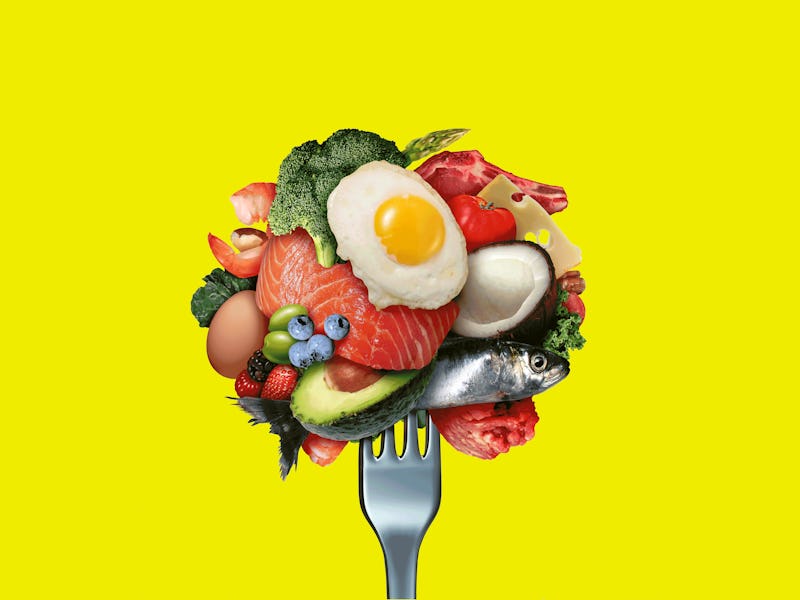A controversial diet might actually be the key to fighting the flu
Influencers love the keto diet. Influenza hates it.

The keto diet has many fans. The idea is that if you cut out all carbs, add fats, and eat a moderate level of protein, then you, too, can brag about higher energy levels and slimmer builds — all while staying full. But weight loss is not all the ketogenic diet may be useful for.
New research suggests the controversial diet may have another side effect: increased protection against one of the most contagious viruses on the planet, influenza.
Just one week on the keto diet protected mice from lethal influenza infection and disease, finds a new study published in the journal Science Immunology. Researchers fed mice a low-carb, high fat diet for seven days, before infecting them with influenza A virus. These mice retained lower quantities of the virus in the lungs and had greater survival rates compared to mice on a high-carb, low-fat “chow diet”, according to the study.
A keto diet consists of lots of fat, moderate protein, and very little carbohydrates. Some question whether the diet is sustainable or has negative long-term health consequences.
Keto’s potential immune boost
The diet’s immune effect may be down to gamma T cells, which are considered the immune system’s first line of defense against pathogens. Eating keto appears to be associated with higher concentrations of gamma T cells in the rodents’ lungs, the researchers found, improving their resistance to the virus.
Gamma T cells are often found in mucus, the body’s slimy, but critical, weapon to defend against foreign bodies. While on the keto diet, the composition of the mice’s lungs’ outer layer changes to produce more mucus. Mucus can trap virus particles, and prevent the flu from infecting target cells, Akiko Iwasaki, professor at Yale University and study co-author, tells Inverse.
But which part of the keto diet — the ketones, high fat, less carbs — spurred the mice’s immune system to create more gamma T cells? To answer this question, the researchers did two additional tests: they fed a ketone “drink” to the mice, and a high-fat, high-carb diet. The first had no effect on the immune system. The second led to boosted gamma-T cells, but not higher protection against the virus.
"The Keto diet might be able to help fight infections, but is certainly no replacement for vaccines!"
“In this study, it seemed to be the adaptation to metabolizing fat and making ketones that was important,” Brianna Stubbs, lead translational scientist at the Buck Institute who was not involved in the study tells Inverse.
At this stage, it’s impossible to know if these provocative findings hold up in humans, or how the keto diet would influence the human body’s fight against the flu.
The keto-flu study was conducted in mice, so how the diet influences human immune function is unclear.
“In humans, there are likely many other factors — environmental, genetics etcetera — that contribute to how likely we are to catch or die from the flu versus in a very homogenous population of mice in very tightly controlled environment,” [Stubbs] says.
“The effect of the ketogenic diet would likely be a lot smaller and less important in a heterogenous and uncontrolled human population,” she says.
How to fight the flu
The study does not suggest that the keto diet serves as a replacement for the flu shot. Instead, the Iwasaki’s team hope their findings will prompt more research into the keto diet’s influence on immune function.
“Nothing can replace the benefit of vaccines, as they provide strong and specific immunity against the flu,” Iwasaki says.
“The Keto diet might be able to help fight infections, but is certainly no replacement for vaccines!” she says.
The annual flu shot is still the best way to protect against influenza.
The human and economic costs of the flu are high: Influenza causes an estimated 20,000 deaths each year in the United States alone. The economic burden of annual flu epidemics in the US — including hospital bills, missed work days, and lost earnings from human deaths — adds up to $87.1 billion.
The annual flu shot recommended in the US, although only moderately effective, is a crucial weapon in the fight against the potentially deadly impacts of the flu, experts say.
“People should still get the flu shot — minimal cost and side effects — and take all the normal precautions to avoid getting infected with influenza,” Stubbs says.
“Given a regular person’s chances of getting the flu then there is probably no need for everyone to go and do keto specifically to protect against the flu,” she says.
But other potential treatments like keto, aside from the annual flu shot, are also worth researching — just in case.
“Maybe if a worldwide, antiviral resistant pandemic for which we had no vaccine started to spread then I’d probably go keto — and hide out in the wilderness — and do what I could to improve my chances of survival,” she says.
Abstract:
Influenza A virus (IAV) infection–associated morbidity and mortality are a key global health care concern, neces- sitating the identification of new therapies capable of reducing the severity of IAV infections. In this study, we show that the consumption of a low-carbohydrate, high-fat ketogenic diet (KD) protects mice from lethal IAV infection and disease. KD feeding resulted in an expansion of gd T cells in the lung that improved barrier functions, thereby enhancing antiviral resistance. Expansion of these protective gd T cells required metabolic adaptation to a ketogenic diet because neither feeding mice a high-fat, high-carbohydrate diet nor providing chemical ketone body substrate that bypasses hepatic ketogenesis protected against infection. Therefore, KD-mediated immune-metabolic integration represents a viable avenue toward preventing or alleviating influenza disease.